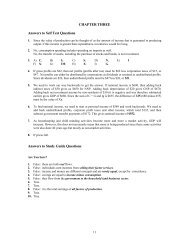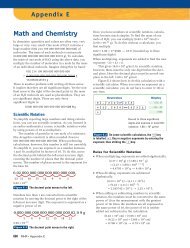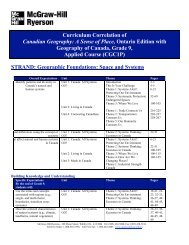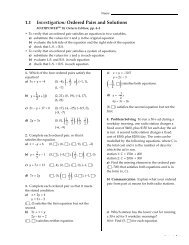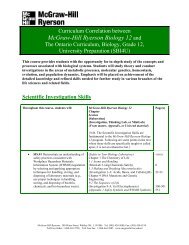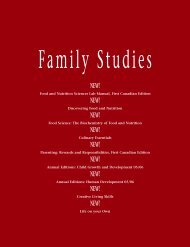Ultranationalism and Crimes against Humanity - McGraw-Hill Ryerson
Ultranationalism and Crimes against Humanity - McGraw-Hill Ryerson
Ultranationalism and Crimes against Humanity - McGraw-Hill Ryerson
You also want an ePaper? Increase the reach of your titles
YUMPU automatically turns print PDFs into web optimized ePapers that Google loves.
Figure 7-9 Routes of Armenian Forced<br />
Marches, 1915<br />
Ottoman Empire<br />
Mediterranean<br />
Sea<br />
158<br />
Black Sea<br />
T a u r u s M o u n t a i n s<br />
0 100 200 300<br />
kilometres<br />
Russian<br />
Empire<br />
To see a map of Turkey in the world today,<br />
turn to the map appendix.<br />
Witnesses took pictures of<br />
what happened to Armenians<br />
in 1915-1916. These photographs<br />
still exist — but the suffering<br />
they show disturbs many<br />
people. Should some of these<br />
photographs have been included<br />
in this book? Why or why not?<br />
Canada was one of the first<br />
countries to attach the label<br />
“genocide” to what happened to<br />
Armenians in 1915–1916. In 2004,<br />
Parliament adopted a motion that<br />
said, “This House acknowledges<br />
the Armenian genocide of 1915<br />
<strong>and</strong> condemns this act as a<br />
crime <strong>against</strong> humanity.”<br />
Persian<br />
Empire<br />
Caspian<br />
Sea<br />
Legend Main Routes of<br />
Armenian Deportation<br />
Turkey Today<br />
State-Sponsored <strong>Crimes</strong><br />
Related Issue 2 • Should nations pursue national interest? • m h R<br />
On April 24, 1915, Turkish soldiers started carrying out their<br />
orders. First, they executed Armenian community leaders. Then<br />
they murdered hundreds of thous<strong>and</strong>s of Armenian soldiers <strong>and</strong><br />
civilians.<br />
Many of those who were left — mostly women <strong>and</strong> children —<br />
were rounded up <strong>and</strong> deported. Without food <strong>and</strong> water, they<br />
were forced to march over mountains <strong>and</strong> through barren regions<br />
toward Syria <strong>and</strong> present-day Iraq.<br />
Some Turks tried to help the Armenians. But fewer than<br />
100 000 of the country’s 2 million Armenians survived.<br />
Henry Morgenthau Sr. was the American ambassador to<br />
Constantinople, which is now called Istanbul. Morgenthau <strong>and</strong><br />
other foreign observers witnessed the events <strong>and</strong> told the world<br />
what was happening. In letters to Washington, Morgenthau called<br />
the forced marches a “new method of massacre.”<br />
After World War I, Turkey found some of those responsible for<br />
the massacre guilty of murder. But those leaders had already fled<br />
to Germany. As result, they were never punished.<br />
Examine the map in Figure 7-9. Use the distance scale to<br />
estimate the length of the forced marches through the mountains.<br />
Did these marches amount to a death sentence? Explain your<br />
response.<br />
Recognizing the Armenian Genocide<br />
The Turkish government admits that many Armenians died in 1915<br />
<strong>and</strong> 1916, but it denies that the deaths were planned. In Turkey,<br />
talking about the Armenian genocide is a crime. Turkish officials<br />
say that the deaths were caused by inter-ethnic violence <strong>and</strong> the<br />
war. Despite this, many countries have now formally recognized<br />
the Armenian massacre as genocide.<br />
Why might the Turkish government believe it important to deny<br />
the Armenian genocide?<br />
Recognizing crimes <strong>against</strong> humanity <strong>and</strong> punishing those<br />
responsible can have an important effect. Because Germany<br />
<strong>and</strong> Turkey were allies, many Germans witnessed the Armenian<br />
genocides.<br />
Some people believe that this genocide became the model<br />
Adolf Hitler later used to kill European Jews. In 1931, for<br />
example, Hitler told a newspaper editor: “We intend to<br />
introduce a great resettlement policy [for Jews] . . . remember the<br />
extermination of the Armenians.”<br />
If the international community had acted quickly to condemn<br />
the Armenian genocide <strong>and</strong> punish those responsible, do you think<br />
Hitler’s plans would have changed? Explain your response.




